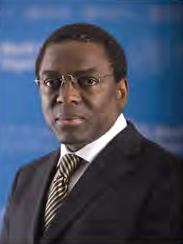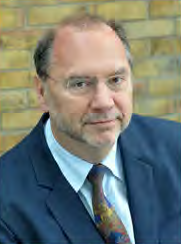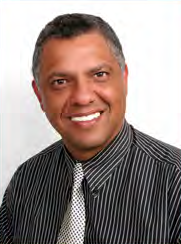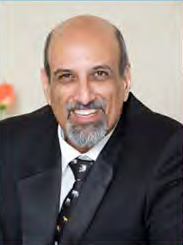Plenary Keynote Speakers

currently serves as the WHO Regional Director for Africa. Before being appointed by the WHO Executive Board to serve in this capacity, he held several leadership positions within WHO since he joined the organisation as Chief of the Inter-Country Strategic Team in Harare, Zimbabwe in 1989. Between 1983 and 1988, Dr. Sambo was Angola’s Vice Minister of Health. Dr. Sambo has a PhD in management from the University of Hull, UK, a medical degree from the School of Medicine of the University of Angola and a diploma of specialist in public health from the Portuguese Medical Association.
In recognition of his contribution and achievements in the field of public health, Dr. Sambo has received a number of awards and distinctions including an Honorary Doctorate (Doutor Honoris Causa) from Universidade Nova de Lisboa – Portugal in 2012; ’Officier de l’Ordre National de la Valeur’ of the Republic of Cameroon in 2012; and ‘Commandeur de l’Ordre National du Mérite du Benin’ in 2012. Dr. Sambo has published several articles in international scientific journals and is a member of a number of international medical and health science associations.

is the Director of the London School of Hygiene and Tropical Medicine, and Professor of Global Health. In 2009-2010 he was the Director of the Institute for Global Health at Imperial College, London. He was the founding Executive Director of UNAIDS and Under Secretary-General of the United Nations from 1995 until 2008, and was an Associate Director of the Global Programme on AIDS of WHO. Under his leadership, UNAIDS became the chief advocate for worldwide action against AIDS, also spearheading UN reform by bringing together 10 UN system organisations. Additionally, he co-discovered the Ebola virus in Zaire in 1976, and led research on AIDS, women’s health and public health in Africa.
Prof. Piot is a member of several eminent international institutions including the Institute of Medicine of the US National Academy of Sciences, the Académie Nationale de Médicine of France and the Royal Academy of Medicine of his native Belgium. He has published over 500 scientific articles and 16 books, including his memoir “No time to lose”. In 2013 he was the laureate of the Hideyo Noguchi Africa Prize for Medical Research.

is currently the Executive Director of the Infectious Diseases Institute in Kampala, Uganda, and previously served as the Executive Director of the largest HIV civil society organisation, The AIDS Service Organization (TASO). In both roles, Dr. Coutinho has supported and implemented numerous studies in HIV/AIDS and other related co-infections. Among other leadership roles, he was also part of the transitional working group to set up The Global Fund to Fight HIV, TB and Malaria, which has provided life-saving medications to millions of people in Africa.
Dr. Coutinho has a Masters of Science from Makerere University School of Medicine (Uganda) and a Masters of Public Health from the University of Witwatersrand (South Africa); he has also earned several diplomas in health science. Dr. Coutinho is particularly interested in studies that have policy and practice significance. He has received numerous awards, including the 2003 Global Humanitarian Action Award from the United Nations Association of the USA and has published over 50 peer reviewed articles.

is a South African clinical infectious diseases epidemiologist who is widely recognised for his research contributions in HIV prevention and treatment. He is Director of the Centre for the AIDS Program of Research in South Africa (CAPRISA), President of the South African Medical Research Council (MRC), and Pro Vice-Chancellor (Research) at the University of KwaZulu-Natal in Durban, South Africa. He is also a professor in many renowned universities including the Mailman School of Public Health at Columbia University, Weill Medical College of Cornell University and Associate Member of The Ragon Institute of Massachusetts General Hospital (MGH), Massachusetts Institute of Technology (MIT) and Harvard University.
His contributions to microbicides for HIV prevention spans two decades and culminated in the CAPRISA 004 tenofovir gel trial which provided proof-of-concept that antiretroviral drugs can prevent sexually transmitted HIV infection and herpes simplex virus type 2 in women. He is co-inventor on patents which have been used in several HIV vaccine candidates. His clinical research on TB-HIV treatment has shaped international guidelines on the clinical management of co-infected patients.
He is the recipient of “TWAS Prize in Medical Sciences” from The Academy of Sciences for the Developing World, the Drug Information Association’s “President's Award for Outstanding Achievement in World Health”, the Gold Medal Award from the Academy of Science in South Africa and the 2011 Outstanding Senior African Scientist Award.

is a Distinguished Scientist/ President Emeritus at FHI360 and Co-Chair of the FHI 360 Advisory Committee. He is based in Accra, Ghana, and provides technical and strategic leadership to FHI360’s public and development programmes in over 65 countries in Africa, Asia, Latin America and the Caribbean. He also holds a part-time position as Professor of Global Non-communicable Diseases at the London School of Hygiene and Tropical Medicine with joint appointments in the Faculty of Epidemiology and Population Health and the Faculty of Public Health and Policy.
Dr. Lamptey is an internationally recognised public health physician and expert in developing countries, with particular emphasis on communicable and non-communicable diseases. With a career at FHI360 spanning more than 30 years, he has been instrumental in establishing FHI360 as one of the world’s leading international nongovernmental organisations in implementing HIV/AIDS prevention, care, treatment and support programmes.
Dr. Lamptey received his medical degree from the University of Ghana, and advanced public health education in the US including a Masters in Public Health from the University of California, Los Angeles (UCLA). He also hold a DrPH from the Harvard University School of Public Health and a nutrition fellowship at the Massachusetts Institute of Technology (MIT).
Dr. Lamptey serves on the Lancet Commission on the Future Health of Africa, the Africa Tobacco Control Committee, Global Advisory Group for the new LSHTM Centre for Global NCDs, and is a member of the CSIS Commission on Smart Global Health Policy.
is a Paediatrician, Tropical Child Health Specialist and Epidemiologist from Zambia, currently serving as a Senior Programme Advisor and Technical Leader for scaling up country programmes for UNICEF’s Global HIV Programme in New York. Dr. Luo has over 15 years of extensive experience in both HIV research and programming.
Before transferring to her current position, she worked as a UNICEF Regional PMTCT Advisor for Eastern and Southern Africa in Nairobi, providing technical guidance to countries in policy and strategy formulation as well as programme design. Dr. Luo was also the UNICEF HIV Officer in Botswana at a time when the government was rapidly scaling up its PMTCT programme.
Prior to joining UNICEF, Dr. Luo worked as a paediatrician in Zambia and the National Health Service in the UK. She holds a medical degree and has post-graduate training in paediatrics from the University of Zambia. She also has a Masters in Tropical Child Health and a PhD from the University of Liverpool.
Dr. Peeling is Professor and Chair of Diagnostics Research at the London School of Hygiene and Tropical Medicine (LSHTM) and the Director of the International Diagnostics Centre (IDC). Trained as a medical microbiologist, Dr. Peeling was the Research Coordinator and Head of Diagnostics Research at the UNICEF/UNDP/World Bank/WHO Special Programme on Research & Training in Tropical Diseases (WHO/TDR) in Geneva, Switzerland, and the co-director of the National Laboratory for Sexually Transmitted Diseases in Canada before assuming her current position. Her work in WHO/TDR focused on diagnostic evaluations to inform policy and procurement. She established the IDC to provide a global hub for advocating the value of diagnostics, fostering innovation, and accelerating regulatory approval and access to quality-assured diagnostics to improve global health.
Dr. Peeling is concerned about ethical issues related to research in developing countries and was appointed the Chair of the WHO Research Ethics Review Committee 2004-6. She was the recipient of a YM-YWCA Women of Distinction Award, a 5NR Award for Canadian Leaders of Sustainable Development. Her research was featured in a Discovery Channel documentary on Chlamydia infection and infertility, and in Fighting Syphilis, a documentary in the highly acclaimed BBC Kill or Cure series.



